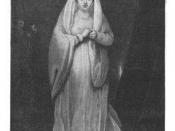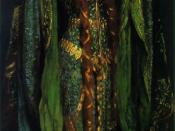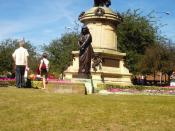The relationship between a husband and wife is affected by their individual traits and affects their decisions together. This is exemplified by Macbeth and Lady Macbeth in Shakespeare's play, Macbeth. Macbeth's courage, ambition, and ambivalence combined with Lady Macbeth's own ambition, cunning, and manipulative nature interact act to culminate in the final decision at the end of Act I to murder Duncan.
Macbeth is first introduced by the wounded captain as a brave warrior and "valor's minion" when the captain reports to Duncan, "For Brave Macbeth (well he deserves that name). / Disdaining Fortuneâ¦" (1.2.18-19). His ambition emerges after he hears the witches' prophecies. He becomes willing to do any manner of gruesome act to gain the throne when he says, "The Prince of Cumberland! That is a step / on which I must fall down or else o'erleap, / For in my way it lies" (1.4.55-56) after he finds out Duncan's son is heir and between him and the throne.
Another of Macbeth's traits, along with bravery and ambition, is his ambivalence. This is particularly obvious in scene 7 of Act I when Macbeth debates in a lengthy soliloquy whether he should kill Duncan. He lists reasons why he shouldn't commit the murder and a reason why he should, making his decision at the end known to Lady Macbeth: "We will proceed no further in this business" (1.7.34). These qualities conflict with each other and Lady Macbeth's traits as well throughout Act I.
Lady Macbeth is a complicated character in that she has qualities perceived as masculine as when Macbeth says, "Bring forth men-children only / For thy undaunted mettle should compose / Nothing but males" (1.7.83-85) and yet we don't know what drives her unwavering decision to murder Duncan. Is she doing ti for her husband as she suggests when she says "â¦the golden round, / Which fate and metaphysical aid doth seem ? To have thee crowned withal" (1.5.31-33) or is she doing it for her own benefit to gain the privileges and luxuries of a queen of Scotland? Lady Macbeth is not only ambitious but sneaky enough to fulfill her ambitions as she shows when she advises Macbeth, "Bear welcome in your eye, / Your hand, your tongue. Look like th' innocent / flower, / But be the serpent under 't" (1.6.76-78). She follows her own advice when she greets Duncan as the humble servant with a smile and gracious words while she is secretly planning his murder. Another assumed unnatural quality in women of the time is Lady Macbeth's ability to manipulate. She demonstrates this when she convinces Macbeth to murder Duncan even after he decided not to, when she says, "When you durst do it, you were a man; / And to be more than when you were, you would / Be so much more the man" (1.7.56-58). Not only is she manipulating him, she's bullying him into the act by insulting his manhood. It is already insulting in today's society, but in Macbeth's immensely patriarchal time, it's all the more offensive. Lady Macbeth's qualities make her a catalyst in the play because of her effect on Macbeth.
Macbeth's traits vie for control throughout the act. His ambition makes him want the throne but bravery and chivalry as a servant of the king keeps him in check. This ambivalence allows him to be easily manipulated by Lady Macbeth. She is ambitious as well but can't do anything due to the restrictions of their society. Therefore, she uses her sneakiness to persuade Macbeth to murder Duncan. By the end of Act I, Macbeth has undergone a huge change from being a brave and loyal servant of the king to a conniving, power hungry killer. Macbeth eventually decides to kill Duncan because of his ambition, Lady Macbeth's ambition, and her ability to get what she wants.
Shakespeare, William. "Macbeth." London: Washington Square Press, 2003.





